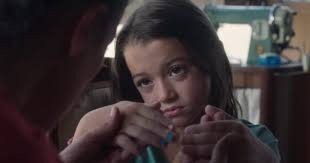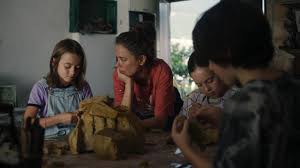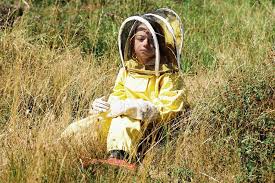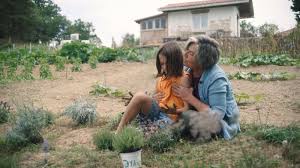The debut feature of Spanish filmmaker Estibaliz Urresola Solaguren is an evocative immersion in a place, avocations of that place, in family and trying to figure out how one fits in all that.
“20,000 Species of Bees” grabs you on several levels, starting with the arresting Basque Country locations. We pick up the rituals of beekeepers, but also explore how one of the fruits of the hive — beeswax — is vital in casting bronze sculptures.
It’s a traditional world, with a very Catholic martiarch, widow of a locally famous sculptor, and the return of her daughter with her three kids. Ave and her brood show up on the eve of St. John the Baptist’s Day, celebrated with a festival and bonfire, allowing them to take a vacation from a struggling marriage and lifestyle just across the border in France.
Whatever else is going on in their lives — husband Gorka is skipping this visit — it is their youngest, Aitor, who seems clingiest and neediest. Aitor prefers to be called “Coco.” Aitor likes having his nails painted, playing dressup and waring his hair long.
Aitor acts-out and is indulged, frets and is comforted, and asks questions — of his slightly older brother Eneko, sister Nerea, and when he’s with them, older family members. And for Aitor, or Coco, answers are always forthcoming.
“Will I be like Dad when I grow up?” (in Spanish with English subtitles). “What’s faith?” “Did you always know you were a boy?”
Aitor is eight years old.
Let’s steer clear of the label “coming of age story” for this sympathetic drama about adults bending over backwards to accomodate what we tend to label what children go through at that age — “phases.”
“He’s eight,” more than one adult shrugs.
Even in this corner of Basque country, there’s tolerance — with limits.
“20,000 Species of Bees” is about a family forcing itself to listen to a kid and a child struggling to find the words and blundering about in confusion and the schisms this causes within the family.
Mother Ane (Patricia López Arnaiz) isn’t hearing the relatives gripe about what’s OK “back home” in France. As supportive as she is, she is distracted, with three kids, an absent husband, a possible teaching job in Bayonne. She relishes the chance to dive into her late father’s workshop to see if she still has the skills and the talent to land that job.
And then what?
“Are you separated,” her mother (Ane Gabarain) wants to know?
Grandmother Lourdes sees the kid’s “girlish” hair and affectations and ponders ways to get Catholicism involved. But Aunt Lita (Itziar Lazkano), granny’s sister, is more worried that Coco’s parents haven’t taken the time to “see” the kid and hear the child out. If Aitor/Coco is asking questions of siblings, insisting on using the women’s toilet and dressing room at the pool with Mom and other little girls, Ane needs to shed some distractions.
Bits of the beekeeper’s work, rituals and traditions meet sculpture casting basics in this sublime drama. But “20,000 Species of Bees” lives on its performancs, and the open-faced/open-hearted turn by little Sofia Otero closes the sale.
It’s a childish, unaffected portrait of impulse, shame and anger. A child gets labeled, and wants to correct that label. But to what? At eight, who would know?
Aitor’s reluctant to wholly embrace the gender-neutral name Coco, with his parents shrugging off every bit of acting-out, accepting their indulgence as a way of getting everyone to school/the train/etc. on time.
That’s how lip service is paid to the push-back in a lot of cultures about the seeming explosion in trans identifying children. But “20,000 Species” has somebody from many points of view for the viewer to identify with.
There is no “media” or pop culture “pressure” behind Aitor’s confusion. Aitor takes it on “faith,”
in his heart, that something’s not connecting him to the sex he was born with.
Arnaiz stands out as the mother, and there’s great contrast between grandma and great aunt — one obsessed with finding a stolen statue of St. John, a prank that precedes their festival some years, and baptisms, the other hearing the kid and seeing the seeing Coco and wondering how blunt she has to be with Ane to get her to do the same.
Even on the remote edge of the Pyrnees, what much of the world recognizes as “gender fluidity” on a sexuality spectrum, their people grew up as knowing that there’s more than one species of bee.
Rating: unrated, adult themes
Cast: Sofía Otero, Patricia López Arnaiz,
Ane Gabarain, Itziar Lazkano, Unax Hayden and
Andere Garabieta
Credits: Scripted and directed by Estibaliz Urresola Solaguren. A Film Movement release.
Running time: 2:08





